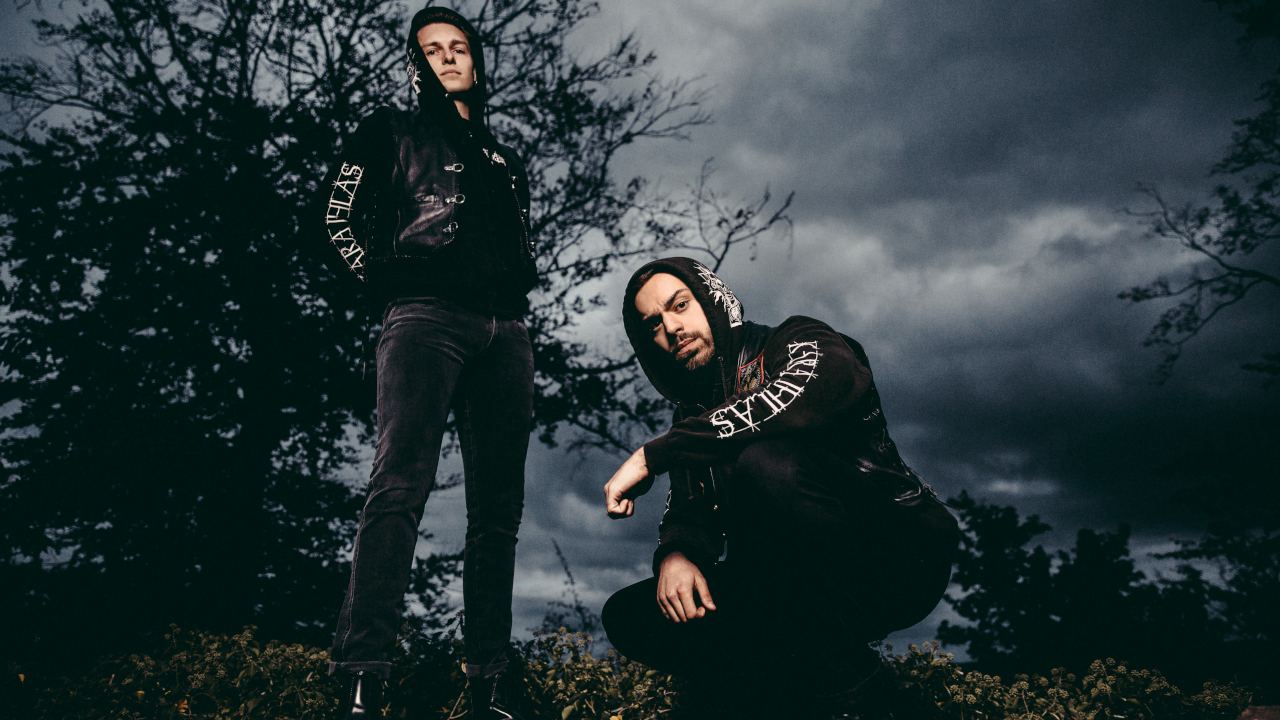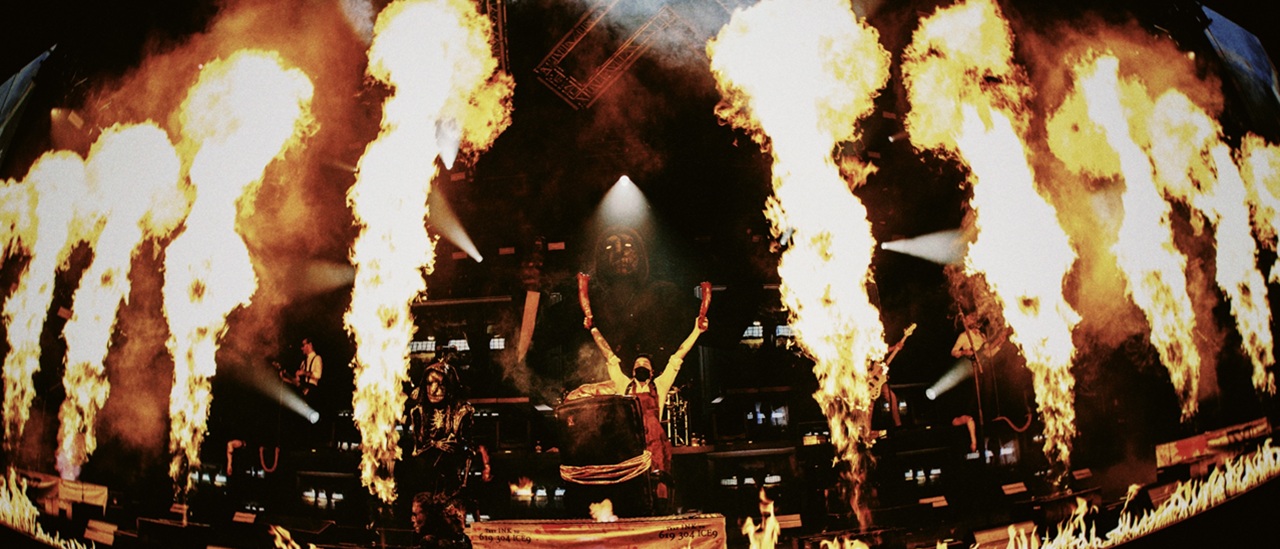Imha Tarikat: The black metal band waging an exhilarating internal war
Imha Tarikat may be Germany-based with Turkish roots, but their explosive black metal is all about forging your own identity

For more than 30 years the ire of black metal has raged against god and mankind alike in a never-ending quest to assert the self. Imha Tarikat take this even further, casting a critical eye inward to stare into the abyss.
“Back when the band started things were pretty rough,” admits Imha Tarikat founder, Kerem Yilmaz. “My depression presented as this sense of being completely numb: but it was a numbness from utter agony and pain that seeped into everything.”
“There were times after recording where I’d be crying or punching walls."
Kerem Yilmaz
Since Imha Tarikat’s first EP, Kenoboros, in 2017, the project has – by and large – remained a solo venture, credited to ‘Ruhsuz Cellât’ (an alter-ego) but intrinsically linked to the identity and heritage of Kerem Yilmaz, giving him an opportunity to explore and externalise his inner turmoil. The band’s 2019 debut, Kara Ihlas, translated this into a flurry of emotion and Nietzschean introspection, building ever-grander melodic structures to house its primal, punkish fury. But while it was applauded for its ability to communicate its emotional core, some elements were nonetheless lost in translation.
“The story was ‘black metal inspired by the Quran’ but that was only partially correct,” Kerem explains. “The way it was expressed was completely wrong.”
In truth, the first record’s associations with the Quran – and usage of the Turkish language – drew heavily from Kerem’s ancestry. Though Kerem was born and raised in Germany, both his parents and grandparents originally came to the country as ‘Gastarbeiter’ – guest workers, invited to address labour shortfalls in the post-World War II economy.
“Because of where they’d come from, a lot of people didn’t want to give my family a chance,” he explains. “I also grew up with that experience and suffered those same things. At times I’ll run into someone and because I have darker hair and skin they’re like, ‘You’re not German, where are you from?’ Even when I say ‘Germany’, because I was born and raised here, they still want to know where I’m from. Equally, when I go to Turkey I get, ‘You’re not Turkish’, because they know I wasn’t born and raised there.”
"I heard Necromancy by Bathory. The level of maliciousness and evil felt almost dirty; it was the first time I felt like expressing what was inside of me."
Kerem Yilmaz
It was a friend who ultimately introduced Kerem to heavy metal culture. “The first time I heard Blinded By Fear by At The Gates I was 14,” Kerem remembers. “I hadn’t even really listened to music at that point other than the Turkish folk my parents would listen to. It was scary, with no reference to rely on. Later, I heard Necromancy by Bathory. The level of maliciousness and evil felt almost dirty; it was the first time I started to feel like expressing what was inside of me.”
Sign up below to get the latest from Metal Hammer, plus exclusive special offers, direct to your inbox!
Kerem found that the music of Imha Tarikat poured out at a prodigious rate, and Kara Ihlas was quickly followed by new album Sternenberster in December 2020, the record expanding his tempestuous take on black metal to form a swirling vortex of emotional anguish and expansive, almost majestic fury.
“There were times after recording where I’d be crying or punching walls, breaking stuff in the room where I was recording, which obviously wasn’t good!” Karem says. “But those things are also a part of what defines us and something we shouldn’t just try to deny.”

Sternenberster had barely been out a few weeks before Kerem returned to the studio, flaying his emotions anew. Lit by the ominous red glow of the studio light, he casts an appropriately demonic visage, but the discussion is as human as it comes. His voice wavers between exhaustion and zealous excitement as he explains the intensive work that goes into recording Imha Tarikat’s music. The song he has just been working on – Touch Of Mercy – took 10 hours to ‘get right’.
“Recording vocals always ends up being the most emotional part of the process,” he admits. “I isolate for a while to get into the right mood and communicate with myself – it’s something I’ve done since our first release. It’s not just recording the music – it’s becoming what I’m doing which is also very heartbreaking. I have to be honest with you, right now I’m feeling… not depressed, but it’s a fucking turbulent wave of emotion I’m on.”
"For me, Imha Tarikat is everything; I fucking live, eat and breathe the band."
Kerem Yilmaz
If you think the recording process sounds emotionally brutal, just consider what happens on the rare occasions the band play a live show. “It’s even worse!” Kerem laughs. “In 2019 we played with some friends in a rehearsal room, only 100 people or so there and… oh my fucking god. It went wild – they were punching me, I was punching them and bottles started flying around – I loved it! It was all about expressing that inner madness, together.”
Considering how much of a toll it takes, you can’t help but wonder if the self-flagellation is truly worth it. But then, hearing Kerem speak – the animation that sends life pouring back into his body like lightning through Frankenstein’s monster – it is completely out of the question that he could be doing anything else.
“For me, Imha Tarikat is everything; I fucking live, eat and breathe the band and when it comes to recording or writing it always has to be done now because there is no later,” he says. “It’s about finding that place where you’re challenging yourself and fully committing to it. Otherwise, how could you possibly be challenging the listener? That’s the purpose of this, it doesn’t suit all situations; I wouldn’t recommend playing Imha Tarikat at parties! It’s a personal ritual – music in the dark, or for going for a walk, taking some time for yourself.”
Sternenberster is out now via Prophecy Productions/Lupus Lounge. A new Imha Tarikat album is expected early 2022.
Staff writer for Metal Hammer, Rich has never met a feature he didn't fancy, which is just as well when it comes to covering everything rock, punk and metal for both print and online, be it legendary events like Rock In Rio or Clash Of The Titans or seeking out exciting new bands like Nine Treasures, Jinjer and Sleep Token.

